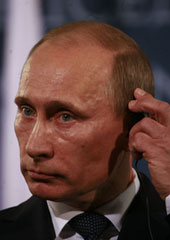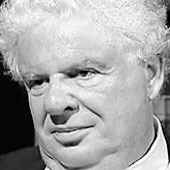Thatcher Lives! In Putin’s Moscow
Can you track the many ways in which Russia’s President and the UK’s late Prime Minister were alike?
April 19, 2013

The waves of tributes around the world and the raucous street parties in some of the poorest slums of Britain both bore witness, in their different ways, to the lasting stamp which the former British Prime Minister put on her country in her 11 years in power from 1979 to 1990.
Thatcher inherited a Britain whose IMF credit rating in 1976 fell to that of Zaire. She left office with her country restored as the fourth-largest industrial economy in the world, behind the United States, Japan and Germany.
Her global impact was remarkable. While she did not inspire Deng Xiaoping’s free market reforms in China — his study of the economic success of Japan, South Korea and Taiwan did that — Chinese economists and policymakers did study her policymaking moves closely and often followed them carefully.
For example, the deregulated financial system of Shanghai in the 1990s owed a great deal to the example of Thatcher’s deregulation of the long moribund City of London in the “Big Bang” of 1986.
For all the disputes over her invasion of the Falklands, one consequence is undeniable. The great democratic wave that toppled brutal military dictatorships across South America in the 1980s and early 1990s was set off by the fact that, at very long range, she defeated the Argentine military junta’s attempt to conquer the Falklands, or Malvinas Islands in 1982. That fatally undermined their claim to fame.
And the Falklands effect wasn’t just limited to Latin America: After the collapse of communism in the Soviet Union and Eastern Europe, I was astonished at the number of Kremlin and satellite regime insiders who testified to the sobering, deterrent effect that her victory over Argentina created in the Soviet Union.
It is all the more ironic, therefore, that Thatcher’s true successor on the global stage today is the man who stabilized the economy of Russia, the successor state to the Soviet system she excoriated for so long.
It is even more ironic that the loudest, most exaggerated tributes to Thatcher in the United States came from fierce critics of current Russian President Vladimir Putin.
Conservative admirers, especially in the United States, repeatedly maintained that no British or European leader of comparable stature had been seen anywhere since she forced out by her own party in a political coup in December 1990.
Yet, Baroness Thatcher does have a true heir in the world today — a leader who shares her iron will, her shrewd, crystal clear political judgment and her determination to restore and uphold the rights and interests of her long impoverished, long-demoralized people and restore them to their historic leading role on the world stage. That leader is Vladimir Putin.
Putin, like Thatcher, took power after 15 years of non-stop linear decline of one of the world’s proudest historic superpowers into a state of chaos, greed and incompetence that evoked the astonishment and even pity of the world.
In 1970s Britain and 1990s Russia, there were entirely justified fears that society might break down totally in chaos, famine, urban riots and full-scale civil war.
Terrorist groups from the ethnic minorities in the territorial fringes of both nations carried out repeated assassinations and mass bombings of innocent civilians. The disintegration of both nations appeared inevitable.
Those conditions faced Margaret Thatcher when she entered No. 10 Downing Street as prime minister in 1979. And they faced Putin when he became first prime minister and then president of Russia in 2000.
Both leaders responded with energy, intelligence and integrity to the challenges facing them. Both of them were motivated by an old-fashioned, straightforward, simple patriotism. (Note: They both loved James Bond movies.)
Their domestic policies and the reactions they provoked were remarkably similar. Putin was widely criticized for ending the direct election of governors, an innovation less than 15 years old in Russia, as president.
For her part, Mrs. Thatcher ended a tradition of self-government in Britain’s major cities to destroy a system that had been hijacked by extreme Trotskyite and communist elements. That brand of irresponsible local government had, for example, brought the great city of Liverpool into a total state of impoverishment and despair from which it still struggles to escape.
Thatcher proved determined and ruthless in fighting the Irish Republican Army in Northern Ireland. When a group of IRA prisoners went on hunger strike demanding political status, all of them jailed for acts of terrorism, most of which had taken innocent lives, she did not try to bargain or pretend to show compassion. She let 11 of them starve to death and broke the back of the protest.
Not to be outdone, Putin proved equally determined and implacable in fighting the nihilistic Chechen terrorists who slaughtered hundreds of innocent Russian schoolchildren in the September 2004 Beslan massacre.
At home, Thatcher waged an undeclared civil war when she showed her determination to break the power of the militant trade unions. For months at a time, riots injuring hundreds of people flared virtually daily as she broke first the National Union of Miners in the North, then the print unions in London.
Thatcher’s actions led to a vast increase in unemployment. Mass demonstrations against her policies drew hundreds of thousands of people out on the streets.
As mentioned at the outset, Thatcher did not hesitate to wage full-scale war when she had to. She ran enormous risks sending the small British fleet 8,000 miles to the other end of the world to recapture the Falkland Islands.
Putin must have seen himself acting in her vein when he acted in a similar manner in 2008, sending the Russian army into independent Georgia to defend the security of Russia’s two allied regions as breakaway enclaves within that former Soviet state.
Both leaders won election as their nation’s leader three times. Putin, ironically, enjoyed far more of a democratic mandate, certainly in 2000 and 2004, than Thatcher did. She never won a clear majority of voters in her three victories of 1979, 1983 and 1987. On each occasion, she had to settle for a plurality of votes against divided opponents.
For all their rhetoric, both leaders were actually quite far far from being haters or opponents of the European Union. Thatcher never tried to withdraw Britain from the European Community. Indeed, she agreed to the Maastricht Treaty in 1990 during her last year in office.
Putin, too, has generally engaged the EU constructively, especially in closing enormous energy deals with his continental European main partners.
However, Thatcher, like Putin, was determined to maintain her country’s traditional national sovereignty and, like Putin, she refused to let European standards on law and human rights interfere with her ruthless determination to crush forces she regarded as enemies of the state.
She and Putin took care only to fight hard in political and actual battles they knew they would win. Both of them stayed closely engaged to Europe and embraced greatly expanded relations with China.
Both of them had strong romantic nationalistic streaks. Both of them took pride in defying global trends towards internationalism and the diffusion of power.
And both of them worked long and hard to restore their traditional nation-states as conceived in the post-1648 Westphalian tradition.
Even the most convinced globalists must acknowledge how much unexpected and (so far) enduring success they both achieved.
On one account, though, one wished Putin had followed the British example far more closely. The economic prospects for his country are greatly diminished due to the fact that the rule of law in Russia is still elusive at best.
Why else would so many wealthy Russians have parked their funds in Cypriote banks? Not performing closer to Thatcher’s baseline is the major dimension were Putin falls woefully short — and where he should take much more courage and determination from the Iron Lady basic framework of core values.
What were the unions to her, nepotistically driven only to benefit the insiders, is the kleptocratic regime over which Putin presides.
Putin thus needs to pay closer attention which side of this core issue for Russia’s future he is on. Is he about breaking Russia really free from its nomenklatura chains of the past? Or is he the chief protector of this dubious network of illicit ties?
Takeaways
Thatcher does have a true heir in the world today — a leader who shares her iron will. That leader is Vladimir Putin.
Putin, like Thatcher, took power after 15 years of nonstop linear decline of one of the world's proudest historic superpowers.
Putin, like Thatcher, wants to reverse the state of chaos, greed and incompetence that has evoked the pity of the world.
Terrorist groups from the ethnic minorities in the territorial fringes of both nations carried out repeated assassinations.
Like Putin, Thatcher refused to let European standards on law and human rights interfere with her plans.
Read previous
Funny Money and the Super-Rich
April 18, 2013
